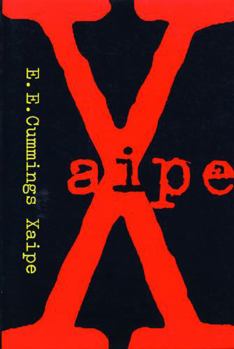Xaipe
Select Format
Select Condition 
Book Overview
Among many poems can be found "dying is fine)but Death," "so many selves(so many friends and gods," "when serpents bargain for the right to squirm," "no time ago," "I thank You God for most this amazing," and "now all the fingers of this tree(darling)have."
Format:Paperback
Language:English
ISBN:0871401681
ISBN13:9780871401687
Release Date:December 2003
Publisher:Liveright Publishing Corporation
Length:80 Pages
Weight:0.35 lbs.
Dimensions:0.3" x 5.5" x 8.2"
Related Subjects
PoetryCustomer Reviews
2 ratings
A comment about this edition
Published by Thriftbooks.com User , 19 years ago
I love e.e. cummings' work. This is no exception. I don't want to review the content of this book, just a note on this edition. The newer edition from Liveright in paperback is probably much prettier, but if you're into retro 70's dustjackets (kelly green and orangy brown) and you'd like to read the poems the way they looked (because with cummings in particular, the look of the poem IS important) fresh out of the typewriter, this edition is for you.
Xaipe: poetry for both eye and ear
Published by Thriftbooks.com User , 22 years ago
In an afterword to "Xaipe," the book of poems by E.E. Cummings, George James Firmage notes that the title is derived from a Greek word whose simplest transliteration is "khi-ra" (with accent on the first syllable). Firmage further notes that the book was published by Oxford in 1950.Xaipe is a curious collection of sequentially numbered poems. Many of the poems are very visually oriented; Cummings plays with with word division, punctuation, and the arrangement of words on the page. He often warps and reshapes language like a sculptor using clay; reading some of these poems is like deciphering a series of strange hieroglyphics.Much of the book is also ear-oriented. Cummings demonstrates his mastery of rhyme, meter, alliteration, and repetition. He even includes a number of sonnets; sonnets, that is, as channeled through his experimental sensibility. The tone of the book varies: cynical, satiric, revelatory, even tender. Cummings often uses seemingly invented words: "livingest" (from poem #1); "unteach" (#5); "fingeryhands," "whying" (#14); etc. One of my favorite poems is #22, a sonnet that begins "when serpents bargain for the right to squirm."But is there an overall theme to "Xaipe"? I'll leave that to each reader to answer. But I sensed in the book as a whole a distrust of officialdom and a wariness of war, and a sense of skepticism about humanity; I felt at times that Cummings was resisting the rationality and formality of language and seeking a pure experience and attentiveness that actually transcends the written or spoken word."Xaipe" feels like a prolonged experiment, and while the experiment may not be wholly successful, it is nonetheless marked by flashes of genius. Definitely a volume of poetry worth exploring. For a stimulating companion text, try something by the philosopher J. Krishnamurti.






